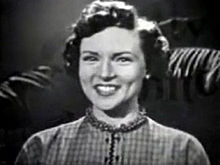| The Betty White Show | |
|---|---|
 Betty White in The Betty White Show in 1954 Betty White in The Betty White Show in 1954 | |
| Genre | Talk show |
| Country of origin | United States |
| No. of seasons | 3 |
| Production | |
| Production location | Los Angeles, California |
| Original release | |
| Network | KLAC-TV (1952–1953) NBC (1954) |
| Release | January 1, 1952 (1952-01-01) – December 31, 1954 (1954-12-31) |
| Related | |
| Betty White Show (1958 TV series) | |
The Betty White Show is a television series that aired on KLAC-TV in 1952 and 1953, and on NBC in 1954. The show was a daytime talk show that also featured entertainment segments that are typical of variety shows. Betty White served as both host and producer.
Background
Betty White began as a cast member of the TV talk show Hollywood on Television in 1949, which was hosted by Al Jarvis and Eddie Albert. The Eddie Albert Show was created as a spinoff of this show, and it premiered on KTLA in January 1952. However, as Albert was in demand as a Hollywood actor, he left the show later that year to film Roman Holiday. With his departure, the show was renamed for Betty White, who became the host and producer of the show. The show continued to air on KLAC-TV until the end of that year.
In 1953, NBC had a weak television lineup, and executives began a search for new content. Hearing of White's popularity, executives flew to LA to audition her. Impressed with her performance, they agreed to air her show on NBC. The show's national premiere was on February 8, 1954. Each episode of the Betty White show featured White singing. She also interviewed guests, performed in skits, and each episode had a children's segment. The show had positive reviews, with Billboard describing White as "attractive, charming and talented", and TV Guide said she had "...the disposition of a storybook heroine."
Opposition to racial segregation
One of White's regular performers was the African American tap dancer Arthur Duncan; whose appearances marked the first time a black person was a series regular on a US talk show. His appearances were the big break that launched his career. However, as the show was syndicated nationally, television stations in the Southern United States threatened a boycott if Duncan remained on the show because his performances conflicted with the racial segregation policies of the Jim Crow laws. White refused to fire him, saying "I'm sorry, but, you know, he stays. Live with it." Duncan was unaware of the controversy until years later. In addition to the issue about Duncan, the show struggled to attract sponsors.
Cancellation
Despite good reviews, the ratings for The Betty White Show were lackluster. Throughout 1954, the show's time slot was repeatedly changed. NBC quietly canceled the program on December 31, 1954.
References
- "The Early Betty White 1947-1973 by Kliph Nesteroff". WFMU's Beware of the Blog. Retrieved January 1, 2022.
- ^ Hyatt, Wesley (November 24, 2020). Betty White on TV: From Video Vanguard to Golden Girl. BearManor Media. ISBN 978-1-62933-657-2. OCLC 1226689495. OL 36642745M. Retrieved January 7, 2022 – via Google Books.
- ^ McNeil, Alex (1996). Total Television: The Comprehensive Guide to Programming from 1948 to the Present. Penguin Books. p. 90. ISBN 0-14-02-4916-8.
- ^ Brockell, Gillian (December 31, 2021). "'Live with it': Betty White defied racist demands in 1954". Washington Post. ISSN 0190-8286. OCLC 2269358. Archived from the original on January 7, 2022. Retrieved January 7, 2022.
- Richmond, Ray (December 7, 2021). Betty White: 100 Remarkable Moments in an Extraordinary Life. becker&mayer!. pp. 46–47. ISBN 978-0-7603-7322-4.
- ^ Keveney, Bill (August 22, 2018). "Betty White: PBS salutes Happy Homemaker, Golden Girl, TV pioneer". USA Today. Retrieved January 1, 2022.
External links
Categories:- 1952 American television series debuts
- 1954 American television series endings
- 1950s American television talk shows
- Casting controversies in television
- American English-language television shows
- NBC talk shows
- Television controversies in the United States
- Race-related controversies in television
- Betty White